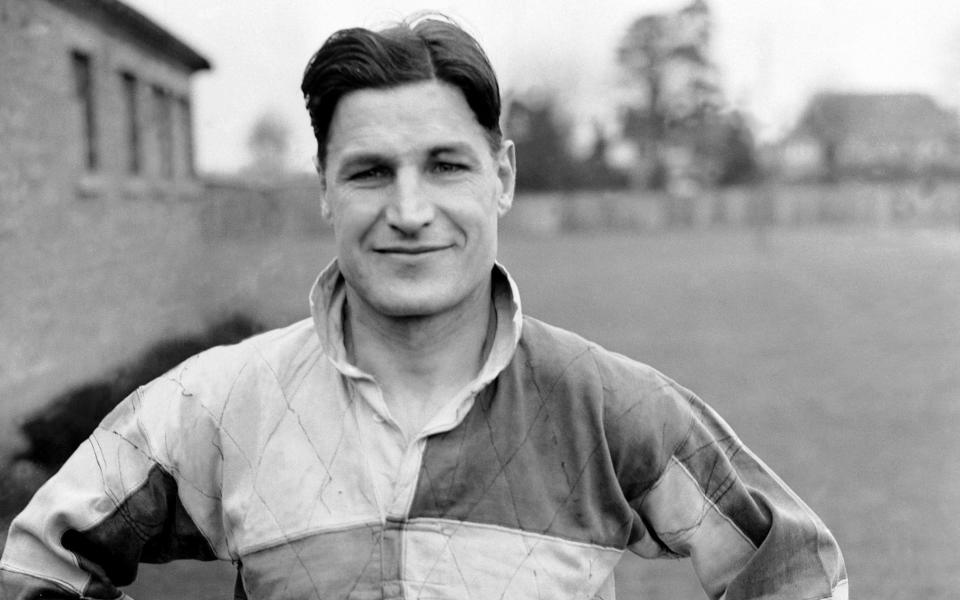Remarkable Harlequins loyalist Peter Woodruff even kept his MBE secret

Rugby produces its fair share of remarkable individuals, but few were more remarkable than Harlequins institution Peter “Charles” Woodruff MBE, who passed away recently.
Having only just celebrated his 99th birthday, he was England’s oldest international and the last to have served in the Second World War. He flew Dakotas for Transport Command and dropped paratroopers over France during the D-Day landings.
Poignantly, he died wearing his Harlequins club tie at Leicester station last month on his way to attend a Harlequins Players’ Association lunch at the Royal Automobile Club. The lunch, at which he was a fixture, would have been all the poorer for his absence.
Born on Oct 30 1920 to Cew and Doris Woodruff, he was one of six siblings. Yet although he was known to team-mates as Charlie, he was Peter to his family. According to an account by Harlequins historian Graeme Roberts, Peter was the name his mother wished to call him, only to be overruled by his grandmother, the matriarch of the family. So he was christened Charles, but was known as Peter.
Growing up in Newport, he nearly ended up playing for Wales rather than England. He even attended a Welsh trial. Instead Woodruff was spotted by an England scout playing for Cheltenham and gained his four caps on the wing for England in the 1951 Five Nations Championship. It was not a particularly successful campaign. He made his debut in a 23-5 defeat to a Lions-laden Wales side. Two further defeats at the hands of Ireland and France, before Woodruff tasted victory in a 5-3 win against Scotland at Twickenham. It would prove to be his last appearance as his place was taken by the giant wing Ted Woodward.
Of course, Woodruff may well have gained many more caps were it not for the war. He signed up for the Royal Air Force straight from Newport High School. Like many of his generation, he was modest to a fault and very rarely mentioned his military service. His close friend Bob Hiller, Quins president, only discovered that he was awarded an MBE at his funeral. He had never mentioned it.
Coming out of the war as a flight lieutenant, Woodruff joined the Civil Service and was spotted playing for the London Civil Service team by former Quins and England forward Peter Brook. At Brook’s insistence, Quins brought him on board. It proved a canny piece of advice as Woodruff made his debut against Cardiff in February and would go on to represent the London club for the next 14 seasons, to the age of 42. There is some confusion as to how many games he fitted in during that period. The official ledger says he made 190 appearances, scoring 62 tries, however there is also a record of him receiving a tankard for making his 200th appearance. He also played for London Counties, Kent, Gloucestershire, Western Counties and the Barbarians. Indeed he was still playing for Stroud 4th XV aged 56 alongside his son, Peter.
He remained a firm part of the Quins family. Back when the club would undertake an end-of-season tour to the West Country and Wales, half the squad would stop over at his home in Stroud, although Woodruff always ensured that his three daughters were not present when they arrived.
Even in his later years, he remained gregarious company. Hiller recalls him tearing around Micky Steele-Bodger’s memorial earlier this year “like a clockwork mouse”. Hiller added: “We couldn’t keep up with him. His family could not keep up with him. A wonderful, wonderful man and an amazing character.”
He was a fixture at the England Rugby Internationals Club (ERIC) bar at matches at Twickenham and never missed a Quins reunion. Among his favourite stories, that Quins recounted in their tribute to him, was how his “Austin A7 was like the milkman’s horse; knew its way home. After a game, Peter was poured into the car at Twickenham and the next thing he remembered was waking up the following morning in the car outside his home in Stroud.” Different times.
Right until his death, he lived life to its very fullest. For all their frippery, Harlequins will be a much less colourful club for his passing.

 Yahoo Sport
Yahoo Sport 





































